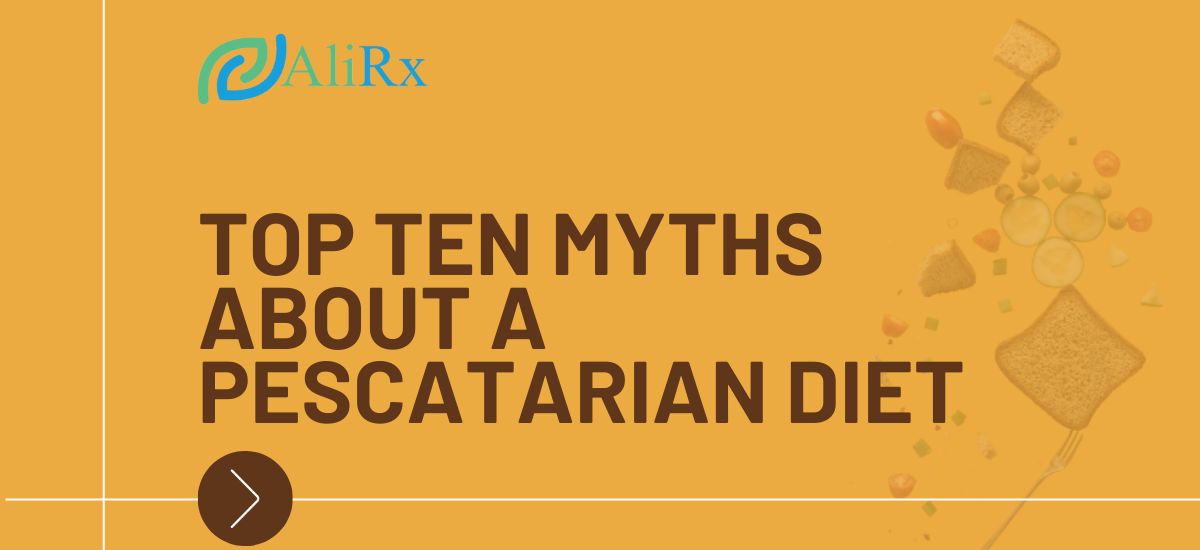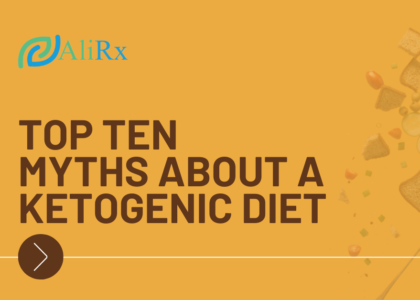Eating a pescatarian diet has become increasingly popular as people seek out more sustainable and healthier options. However, there are many myths surrounding the pescatarian diet.
In this list, we will explore the top ten myths about the pescatarian diet and provide evidence-based resources to refute them. We will discuss topics such as protein sources, vegetables, iron, omega-3 fatty acids, calcium, and more.
Myth #1. Pescatarians don’t get enough protein.
Some people believe that pescatarians don’t get enough protein because they are unfamiliar with the sources of protein that are available to pescatarians, such as fish, eggs, and dairy, as well as plant-based sources such as legumes, nuts, and seeds. Moreover, some people may mistakenly believe that seafood is not a significant source of protein.
FACT: Pescatarians get their protein from fish, eggs, and dairy, as well as from plant-based sources such as legumes, nuts, and seeds.
Myth #2. Pescatarians don’t eat enough vegetables.
This is not true. Going pescatarian means avoiding eating any type of meat that isn’t seafood but does not necessarily mean not eating fruits and vegetables at all. In fact, pescatarians are defined as vegetarians who also consume fish and seafood products.
FACT: Pescatarians can get their recommended daily intake of vegetables from a variety of sources, including fresh vegetables, legumes, and grains.
Myth #3. Pescatarians don’t get enough iron.
According to the National Institutes of Health, dark leafy greens, tofu, tempeh, legumes, nuts, and seeds, as well as some fortified breakfast cereals, are all good sources of dietary iron for pescatarians. Furthermore, the American Heart Association states that fatty fish such as salmon and tuna are particularly high in iron.
FACT: Pescatarians can get their iron from fish, legumes, and grains.
Myth #4. Pescatarians can’t make a balanced diet.
Pescatarians can make a balanced diet which includes fish, eggs, dairy, legumes, nuts, seeds, fruits, vegetables, and whole grains. Moreover, pescatarians get enough vitamins and minerals from their diet by eating a variety of nutrient-rich foods.
FACT: Pescatarians can make a balanced diet by eating a variety of foods from all food groups.
Myth #5. Pescatarians don’t get enough omega-3 fatty acids
This is a myth because plant-based sources of omega-3 fatty acids include flaxseed, chia seeds, walnuts, and edamame which pescatarians can eat. Some fortified plant-based milks and juices also contain omega-3 fatty acids.
FACT: Pescatarians can get their omega-3 fatty acids from fatty fish such as salmon, tuna, and mackerel.
Myth #6. Pescatarians can’t get enough calcium.
Some fish, such as sardines and salmon, contain calcium. Pescatarians can also get calcium from certain legumes, nuts, and seeds.
FACT: Pescatarians can get their calcium from dairy, fortified plant-based milk, and dark leafy greens.
Myth #7. Pescatarians can’t eat out.
This is a myth because pescatarians can find many restaurants that serve dishes that fit their diet, from sushi to seafood. Also, many restaurants offer vegetarian and vegan options that can be adapted for pescatarians. More and more restaurants are increasing their selection of plant-based dishes, making it easier for pescatarians to dine out.
FACT: Pescatarians can find many restaurants that serve dishes that fit their diet, from sushi to seafood.
Myth # 8. Pescatarians don’t get enough B12.
On the contrary, pescatarians do get enough B12. It can be found from fortified plant-based milks and nutritional yeast, for instance. Did you know that some fish, such as salmon, tuna, and mackerel, also contain B12? Lastly, some fortified breakfast cereals and nutritional yeast also contain B12.
FACT: Pescatarians can get their B12 from fortified plant-based milks and nutritional yeast.
Myth #9. Pescatarians can’t eat sushi.
This is not true. Pescatarians can enjoy sushi. The only thing pescatarians don’t eat on sushi are those with mayonnaise, cream cheese, and other animal products. Otherwise, sushi is OK. Many sushi restaurants offer vegetarian and vegan options that can be adapted for pescatarians.
FACT: Pescatarians can enjoy sushi, as long as it does not contain other animal products such as cream cheese or mayonnaise.
Myth #10. Pescatarians can’t eat fish.
As it has been numerous times above, pescatarians actually do eat fish. What this means is that the fish has been caught in a manner that preserves the population and is not detrimental to the environment. A sustainably sourced fish is typically better for the health of the consumer, as it is not contaminated with pollutants or other toxins. Plus, supporting sustainable fishing practices helps to ensure that future generations will have access to fish.
FACT: Pescatarians are allowed to eat fish, as long as it is sustainably sourced.
References:
https://health.clevelandclinic.org/pescatarian-diet/
https://www.ncbi.nlm.nih.gov/pmc/articles/PMC7525113/
https://www.ncbi.nlm.nih.gov/pmc/articles/PMC8003004/ / https://www.heart.org/en/healthy-living/healthy-eating/eat-smart/fats/fish-and-omega-3-fatty-acids
https://www.nhs.uk/live-well/eat-well/how-to-eat-a-balanced-diet/eating-a-balanced-diet/
https://www.nhs.uk/live-well/eat-well/food-types/fish-and-shellfish-nutrition/
https://newsinhealth.nih.gov/2012/07/digging-vegetarian-diet





